Curly coat is caused by a mutation in the KRT71 gene that makes a dog’s hair curl if it gets long enough. Curly-coated dogs can be bearded or smooth-faced, and they can have a soft or wiry coat texture.
Curly Coat
Our dog’s hair is composed of different types of keratin. A normal round hair shaft causes straight hair, while a slightly flattened hair shaft results in a bent and curly shape.
Dogs can have a wavy coat, big loose curls or small ringlets.
If a dog has wavy or curly hairs seems to depend on many factors, e.g. on how many copies of the causal allele it has and on its overall hair texture, hair thickness, and coat length.
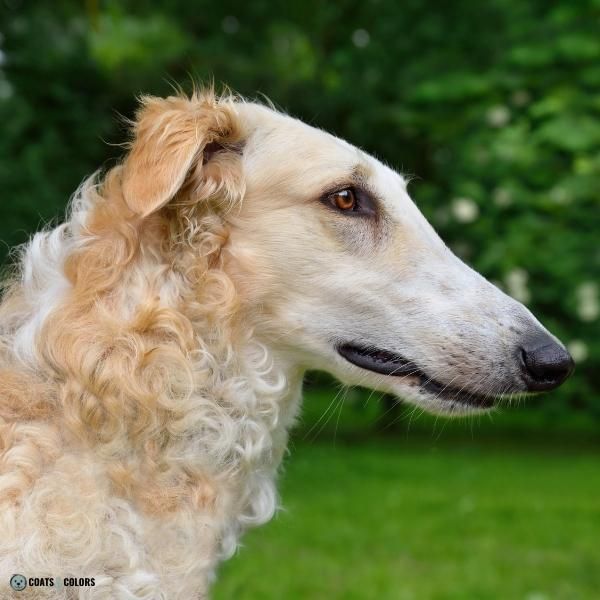
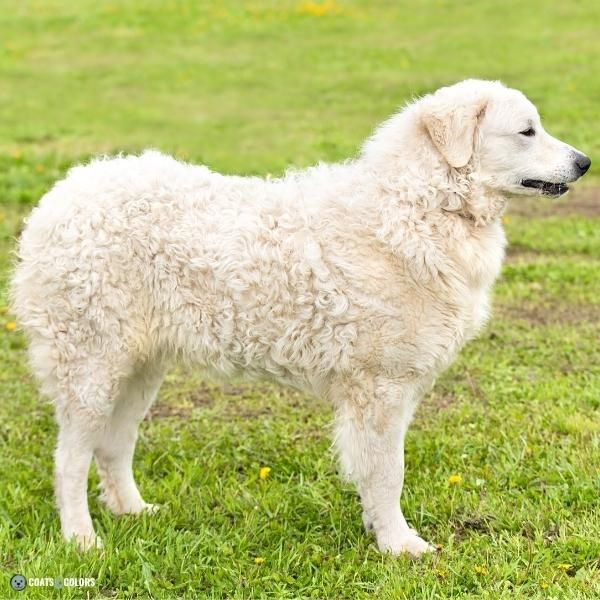
The presence of wavy or curly hair mainly depends on hair length. Short-haired dogs, for example, can still have a gene variant for a curly coat. But their hair is simply too short to actually curl.
And even the curly breeds need some time before the curls appear on young puppies.

The Curly Locus
Curly coat is caused by different mutations in the KRT71 gene (keratin 71) on dog chromosome 27[1,4].
KRT71 is a type of keratin thatbgets expressed in the inner root sheath of the hair follicle. It plays a role in the correct growth of the hair follicle.
The mutant variant of KRT17 that causes curly coat seems to significantly affect the structure of keratin 71. This changes the shape of the hair shaft and causes it to curl into a spiral.
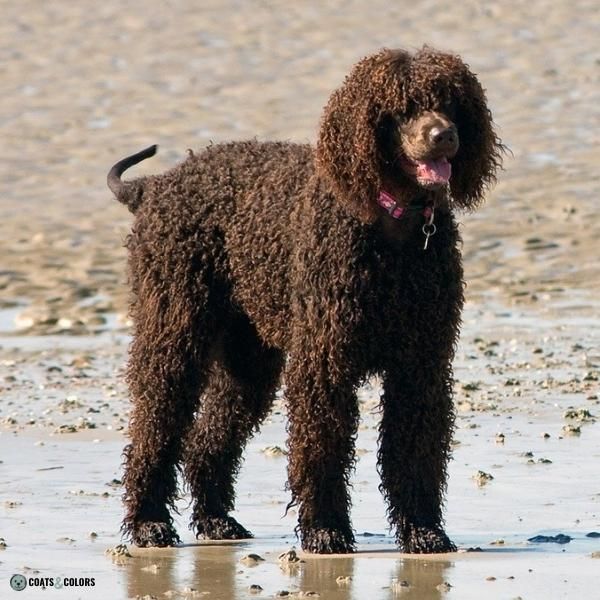
The common variant of KRT17 found in most curly dog breeds is Cu1. Another variant called Cu2 was found in Curly Coated Retrievers, this breed even seems to be fixed for a Cu2/Cu2 genotype[2,3].
The Cu2 allele also occurs in some other breeds like Lagotto Romagnolo, Bichon Frisé, Irish Terrier, Chesapeake Bay Retriever, Mudi, Spanish Water Dog, Kuvasz, or Poodle.
Please note that not all companies test for both variants!
All combinations of mutant alleles (Cu1/Cu1, Cu1/Cu2, Cu2/Cu2) cause a curly coat. And there even seem to be some dogs that have compound haplotype with both theCu1 and Cu2 mutation on the same chromosome[2].
But there’s a downside… There is some evidence that the Cu2 allele might be a genetic risk factor predisposing affected dogs for some forms of follicular dysplasia.
Curly hair due to Cu2 seems not to be anchored as tightly in the skin as curls caused by Cu1.
Some owners of dogs with Cu2 report that hair shafts on their dogs break more easily when exposed to mechanical friction, can be plucked quite easily or that their dogs suffer from symmetrical hair loss.
Aside from Cu1 and Cu2, there might be additional alleles at the curly locus. There are some obviously curly dogs out there that don’t test positive for either of the known mutations.
A dog only needs one copy of Cu1 or Cu2 to grow curly hair[5].But the curly traits shows incomplete dominance with two copies (Cu/Cu) causing proper curls and one copy (Cu/N) often giving a wavy coat.
Dogs with two wild-type alleles (N/N) will have straight hair.
Curly Coat Calculator
Dogs with a curly coat can be carriers for the wild-type allele (Cu1/N or Cu2/N). Mating two carriers can produce puppies with a straight coat (N/N).
This simple tool can help you predict the outcome of different combinations of dogs with or without curly coat:
Curly Coat Types
How curls will look on a particular dog depends on other coat characteristics, i.e. length and furnishings.
Curly hair growth is only visible on dogs with sufficient hair length.
Short Curly Coat
The Cu1 variant of KRT71 occurs in some short-haired dog breeds.
But the hairs on a smooth-coated dog simply are too short to coil.
Only longer hairs along the hackles might show a suspiciously wavy growth pattern.
| Long | Curly | Wire |
| ✗ | ✓ | ✗ |
The Cu1 allele occurs (often at a very low frequency) in surprisingly many smooth-coated dogs like German Shepherds, Beagle, Australian Cattle Dog, Manchester Terrier, Boxer, Great Dane, and many more[6].
Chessies often have long enough coat that they have a curly variant.
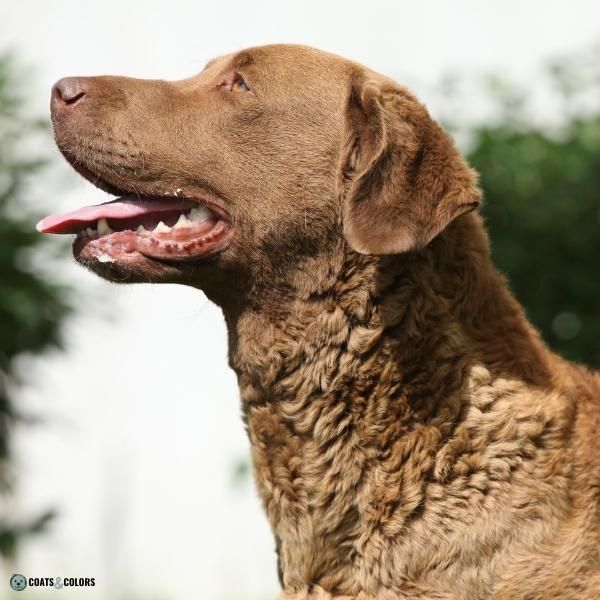
Long Curly Coat
On a long-haired dog without furnishings, only the areas with longer hair will be curly. These dogs still have very short hair on their face and legs, which will not be curly.
| Long | Curly | Wire |
| ✓ | ✓ | ✗ |
Some breeds with this phenotype are Irish Water Spaniel, Epagneul de Pont Audemer, Wetterhoun, Mudi, Croatian Sheepdog, Kuvasz, or the Curly Coated Retriever.
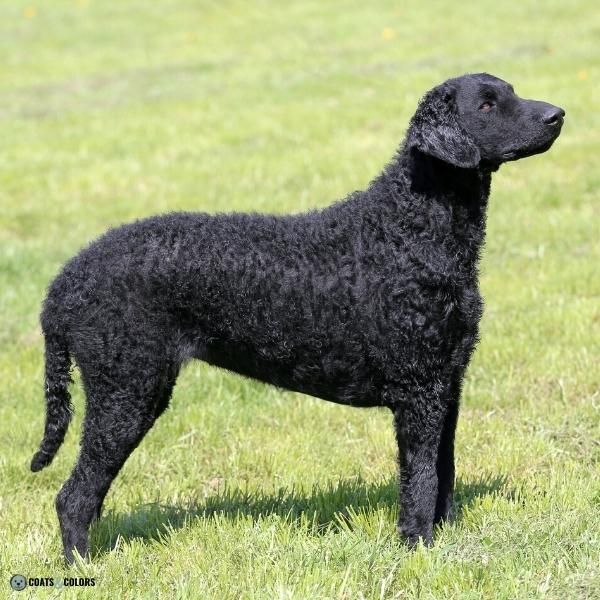
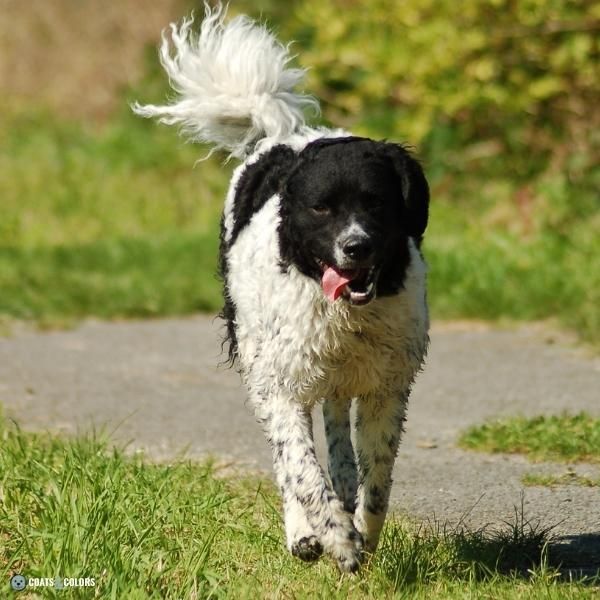
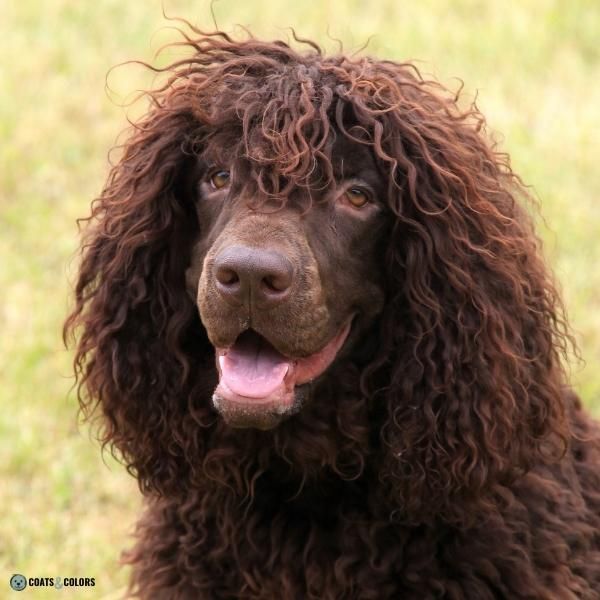
Curly Coated Retrievers have a very tight and crisp curl phenotype. This breed is fixed for Cu2/Cu2, which might make them vulnerable to coat disorders or give them a sparsely haired “rat tail”.
A curly or wavy coat also occurs in some Borzoi, Border Collies, Chihuahuas, Yorkshire Terriers, Leonbergers, Westies, Tibetan Terriers and other dog breeds with long-haired phenotypes.
Not all of these breeds consider curly a standard coat type.
Wire Curly Coat
Short-haired dogs with furnishings will have long hair on their face, eyebrows and legs. The wiry body hair has a moderate and even length and will, in most cases, be long enough to express curls.
| Long | Curly | Wire |
| ✗ | ✓ | ✓ |
Some examples for curly wire-haired dogs are Airedale Terrier, Fox Terrier, Lakeland Terrier, Welsh Terrier and very few Irish Terriers. But keep in mind that some very wire-haired dogs can have wavy or even somewhat frizzy hair, even without having one of the mutations associated with a curly coat in dogs!
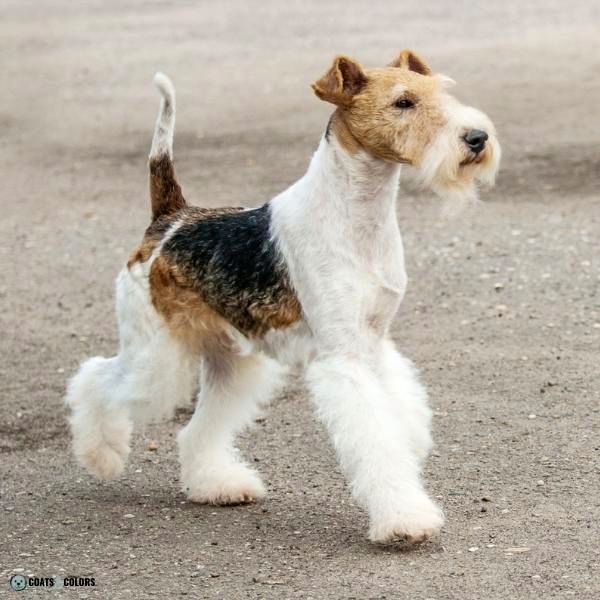
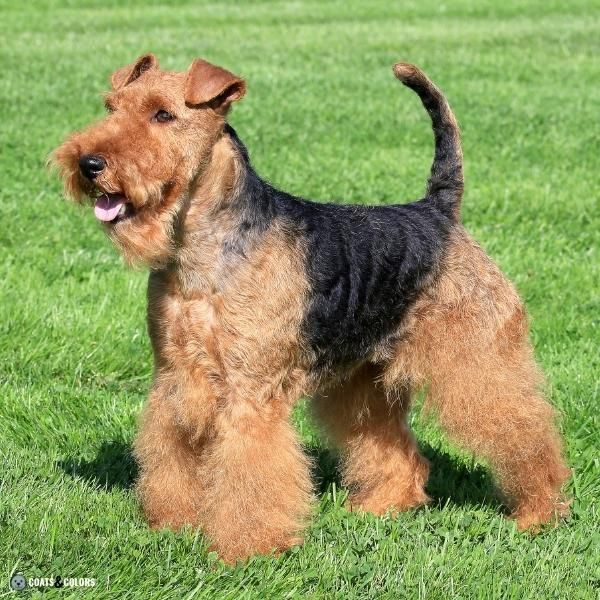
Bearded Curly Coat
Dogs that express a combination of long hair, curly hair and furnishings will often produce an ever-growing and non-shedding coat. These are the classic “super curly” breeds.
| Long | Curly | Wire |
| ✓ | ✓ | ✓ |
This is the coat type typical for Poodles, Bichon Frisé, Pumi, Barbet, Bolognese, Lagotto, Spanish Water Dog, and many Irish Soft Coated Wheaten Terriers.

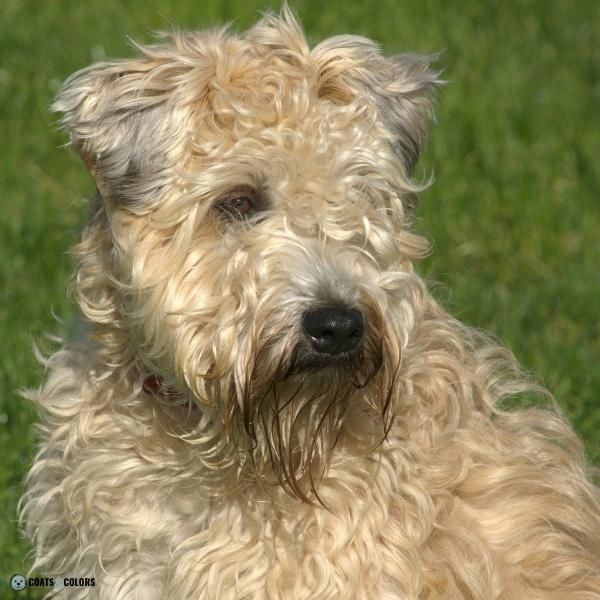
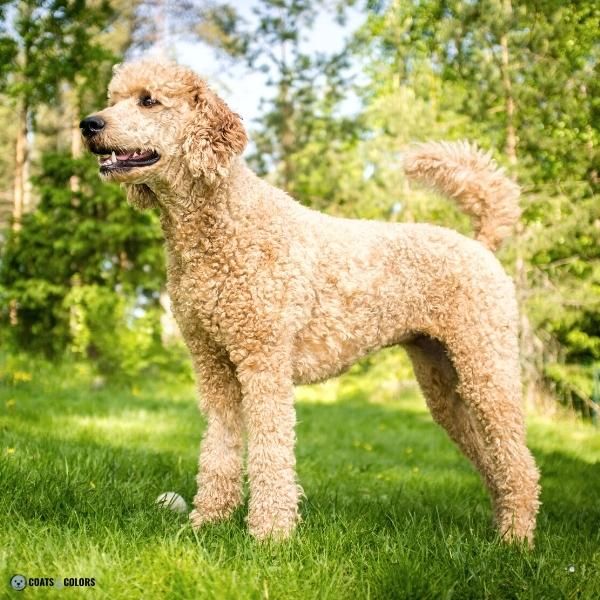
Curly Dog Breeds
Here are some of the dog breeds where curly coats are common:
- Airedale Terrier
- American Water Spaniel
- Barbet
- Bedlington Terrier
- Bergamasco Sheepdog
- Bichon Frise
- Bolognese
- Bolonka Zwetna
- Borzoi
- Chesapeake Bay Retriever
- Croatian Sheepdog
- Curly Coated Retriever
- Epagneul de Pont Audemer
- Irish Water Spaniel
- Kerry Blue Terrier
- Komondor
- Kuvasz
- Lagotto Romagnolo
- Lakeland Terrier
- Mudi
- Poodle
- Portuguese Water Dog
- Pumi
- Soft Coated Wheaten Terrier
- Spanish Water Dog
- Welsh Terrier
- Wetterhoun
- Wire Fox Terrier
Learn More
Links
[1] Cadieu et. al.. Coat variation in the domestic dog is governed by variants in three genes. Science 326:150-3, 2009. Pubmed reference: 19713490. https://doi.org/10.1126/science.1177808
[2] Bauer A, Hadji Rasouliha S, Brunner MT, Jagannathan V, Bucher I, Bannoehr J, Varjonen K, Bond R, Bergvall K, Welle MM, Roosje P, Leeb T. A second KRT71 allele in curly coated dogs. Anim Genet. 2019 Feb;50(1):97-100. doi: 10.1111/age.12743. Epub 2018 Nov 15. Erratum in: Anim Genet. 2021. https://doi.org/10.1111/age.12743
[3] Salmela, E., Niskanen, J., Arumilli, M., Donner, J., Lohi, H., Hytönen, M.K., Salmela, E., Niskanen, J., Arumilli, M., Donner, J., Lohi, H., Hytönen, M.K., Salmela, E., Niskanen, J., Arumilli, M., Donner, J., Lohi, H., Hytönen, M.K. : A novel KRT71 variant in curly-coated dogs. Anim Genet 50:101-104, 2019. https://doi.org/10.1111/age.12746
[4] Online Mendelian Inheritance in Animals (OMIA). Sydney School of Veterinary Science, University of Sydney. OMIA 000245-9615 (08/2021): Curly coat in Canis lupus familiaris. https://www.omia.org/OMIA000245/9615/
[5] Paw Print Genetics: Cu Locus (Curly Hair).
[6] Dreger DL, Hooser BN, Hughes AM, Ganesan B, Donner J, Anderson H, et al. (2019). True Colors: Commercially-acquired morphological genotypes reveal hidden allele variation among dog breeds, informing both trait ancestry and breed potential. PLoS ONE 14(10): e0223995. https://doi.org/10.1371/journal.pone.0223995
Image Credits
© fotojagodka/canva.com
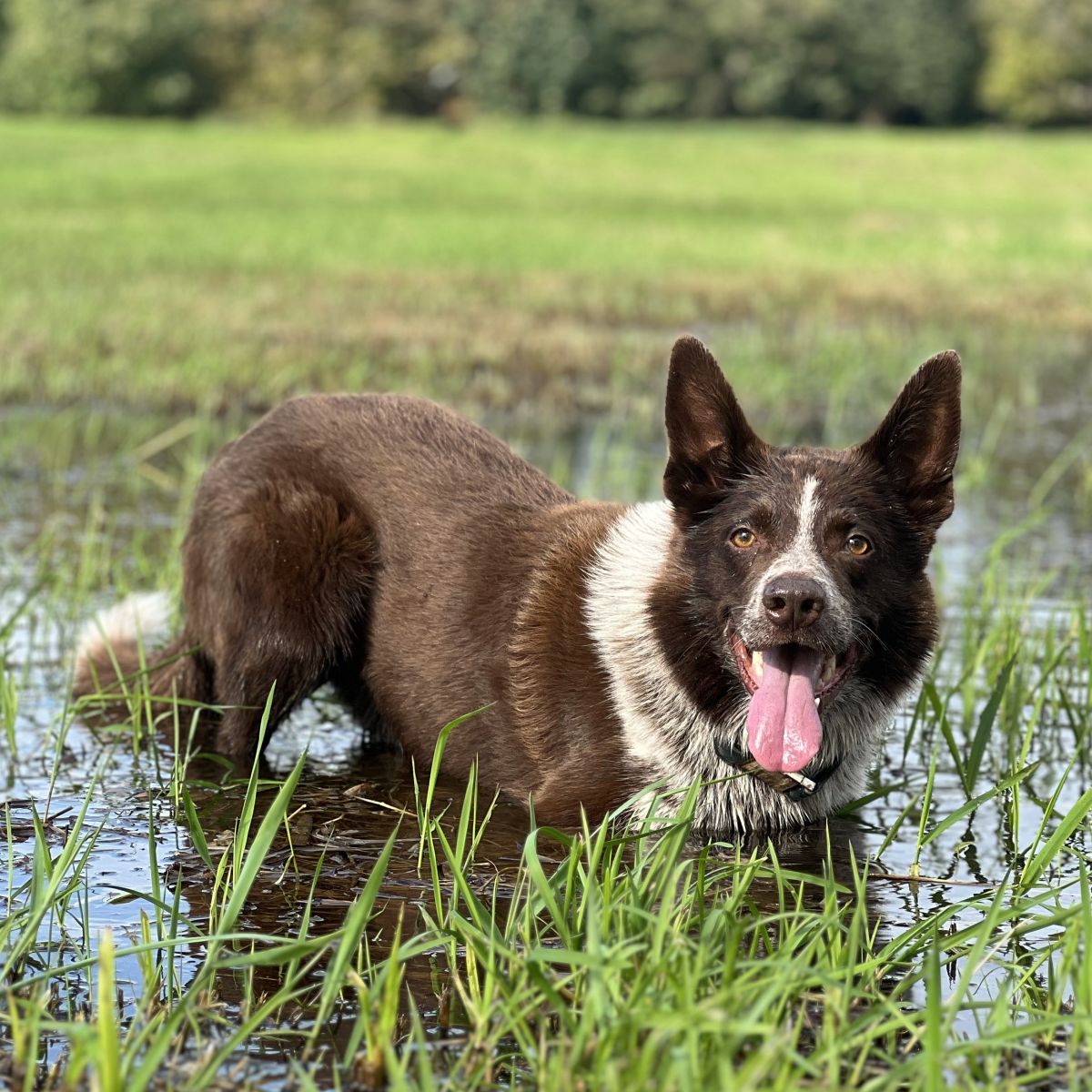
Hi! I’m Steffi. I am a biologist and a big time dog nerd. You are curious about coat color genetics? You’ve come to the right place! Read more.

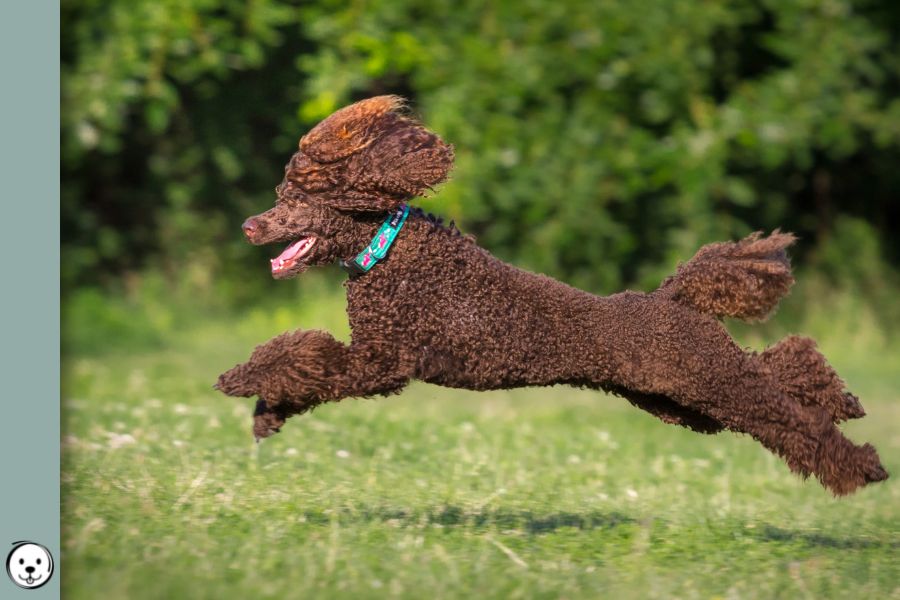
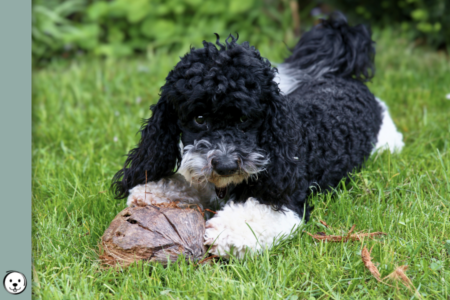
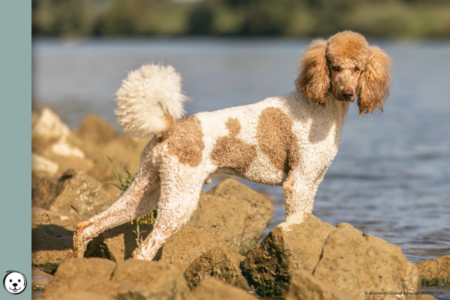
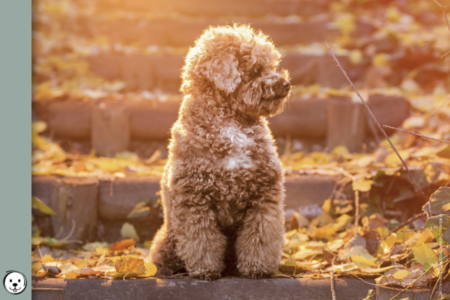

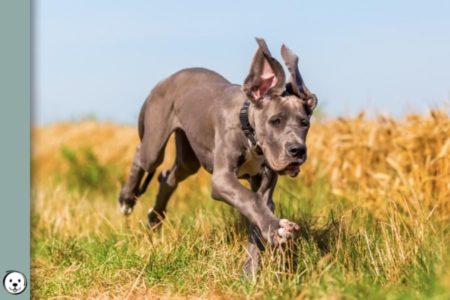
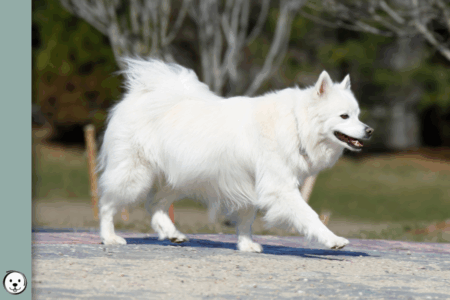
1 thought on “Cu-Locus: Curly Coat in Dogs”
Comments are closed.